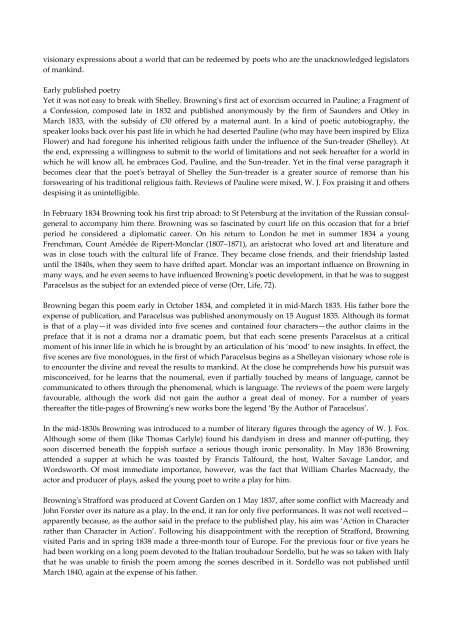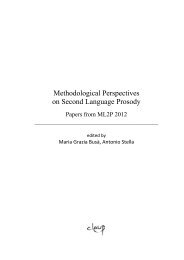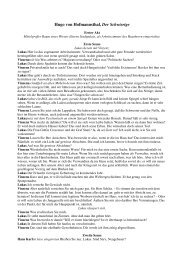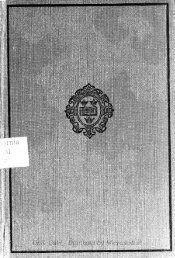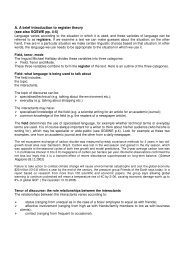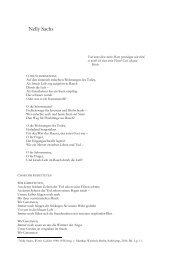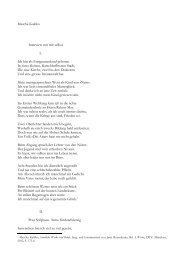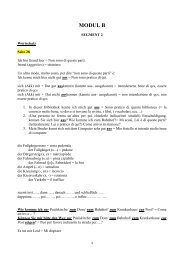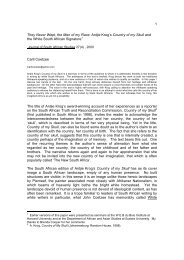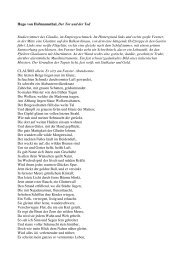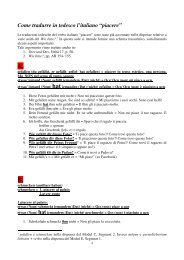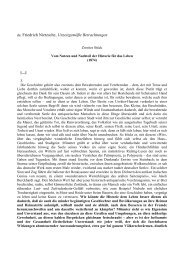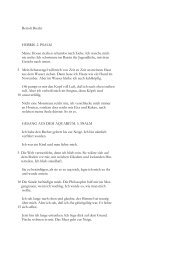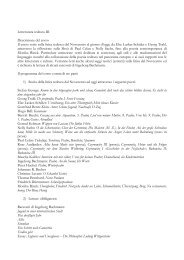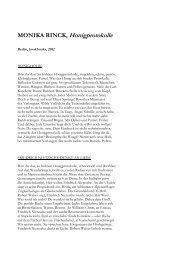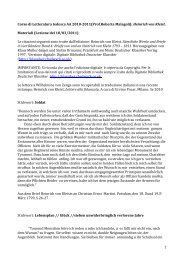The lives of the poets from The Dictionary of National Biography ...
The lives of the poets from The Dictionary of National Biography ...
The lives of the poets from The Dictionary of National Biography ...
You also want an ePaper? Increase the reach of your titles
YUMPU automatically turns print PDFs into web optimized ePapers that Google loves.
visionary expressions about a world that can be redeemed by <strong>poets</strong> who are <strong>the</strong> unacknowledged legislators<br />
<strong>of</strong> mankind.<br />
Early published poetry<br />
Yet it was not easy to break with Shelley. Browningʹs first act <strong>of</strong> exorcism occurred in Pauline; a Fragment <strong>of</strong><br />
a Confession, composed late in 1832 and published anonymously by <strong>the</strong> firm <strong>of</strong> Saunders and Otley in<br />
March 1833, with <strong>the</strong> subsidy <strong>of</strong> £30 <strong>of</strong>fered by a maternal aunt. In a kind <strong>of</strong> poetic autobiography, <strong>the</strong><br />
speaker looks back over his past life in which he had deserted Pauline (who may have been inspired by Eliza<br />
Flower) and had foregone his inherited religious faith under <strong>the</strong> influence <strong>of</strong> <strong>the</strong> Sun‐treader (Shelley). At<br />
<strong>the</strong> end, expressing a willingness to submit to <strong>the</strong> world <strong>of</strong> limitations and not seek hereafter for a world in<br />
which he will know all, he embraces God, Pauline, and <strong>the</strong> Sun‐treader. Yet in <strong>the</strong> final verse paragraph it<br />
becomes clear that <strong>the</strong> poetʹs betrayal <strong>of</strong> Shelley <strong>the</strong> Sun‐treader is a greater source <strong>of</strong> remorse than his<br />
forswearing <strong>of</strong> his traditional religious faith. Reviews <strong>of</strong> Pauline were mixed, W. J. Fox praising it and o<strong>the</strong>rs<br />
despising it as unintelligible.<br />
In February 1834 Browning took his first trip abroad: to St Petersburg at <strong>the</strong> invitation <strong>of</strong> <strong>the</strong> Russian consul‐<br />
general to accompany him <strong>the</strong>re. Browning was so fascinated by court life on this occasion that for a brief<br />
period he considered a diplomatic career. On his return to London he met in summer 1834 a young<br />
Frenchman, Count Amédée de Ripert‐Monclar (1807–1871), an aristocrat who loved art and literature and<br />
was in close touch with <strong>the</strong> cultural life <strong>of</strong> France. <strong>The</strong>y became close friends, and <strong>the</strong>ir friendship lasted<br />
until <strong>the</strong> 1840s, when <strong>the</strong>y seem to have drifted apart. Monclar was an important influence on Browning in<br />
many ways, and he even seems to have influenced Browningʹs poetic development, in that he was to suggest<br />
Paracelsus as <strong>the</strong> subject for an extended piece <strong>of</strong> verse (Orr, Life, 72).<br />
Browning began this poem early in October 1834, and completed it in mid‐March 1835. His fa<strong>the</strong>r bore <strong>the</strong><br />
expense <strong>of</strong> publication, and Paracelsus was published anonymously on 15 August 1835. Although its format<br />
is that <strong>of</strong> a play—it was divided into five scenes and contained four characters—<strong>the</strong> author claims in <strong>the</strong><br />
preface that it is not a drama nor a dramatic poem, but that each scene presents Paracelsus at a critical<br />
moment <strong>of</strong> his inner life in which he is brought by an articulation <strong>of</strong> his ‘mood’ to new insights. In effect, <strong>the</strong><br />
five scenes are five monologues, in <strong>the</strong> first <strong>of</strong> which Paracelsus begins as a Shelleyan visionary whose role is<br />
to encounter <strong>the</strong> divine and reveal <strong>the</strong> results to mankind. At <strong>the</strong> close he comprehends how his pursuit was<br />
misconceived, for he learns that <strong>the</strong> noumenal, even if partially touched by means <strong>of</strong> language, cannot be<br />
communicated to o<strong>the</strong>rs through <strong>the</strong> phenomenal, which is language. <strong>The</strong> reviews <strong>of</strong> <strong>the</strong> poem were largely<br />
favourable, although <strong>the</strong> work did not gain <strong>the</strong> author a great deal <strong>of</strong> money. For a number <strong>of</strong> years<br />
<strong>the</strong>reafter <strong>the</strong> title‐pages <strong>of</strong> Browningʹs new works bore <strong>the</strong> legend ‘By <strong>the</strong> Author <strong>of</strong> Paracelsus’.<br />
In <strong>the</strong> mid‐1830s Browning was introduced to a number <strong>of</strong> literary figures through <strong>the</strong> agency <strong>of</strong> W. J. Fox.<br />
Although some <strong>of</strong> <strong>the</strong>m (like Thomas Carlyle) found his dandyism in dress and manner <strong>of</strong>f‐putting, <strong>the</strong>y<br />
soon discerned beneath <strong>the</strong> foppish surface a serious though ironic personality. In May 1836 Browning<br />
attended a supper at which he was toasted by Francis Talfourd, <strong>the</strong> host, Walter Savage Landor, and<br />
Wordsworth. Of most immediate importance, however, was <strong>the</strong> fact that William Charles Macready, <strong>the</strong><br />
actor and producer <strong>of</strong> plays, asked <strong>the</strong> young poet to write a play for him.<br />
Browningʹs Strafford was produced at Covent Garden on 1 May 1837, after some conflict with Macready and<br />
John Forster over its nature as a play. In <strong>the</strong> end, it ran for only five performances. It was not well received—<br />
apparently because, as <strong>the</strong> author said in <strong>the</strong> preface to <strong>the</strong> published play, his aim was ‘Action in Character<br />
ra<strong>the</strong>r than Character in Action’. Following his disappointment with <strong>the</strong> reception <strong>of</strong> Strafford, Browning<br />
visited Paris and in spring 1838 made a three‐month tour <strong>of</strong> Europe. For <strong>the</strong> previous four or five years he<br />
had been working on a long poem devoted to <strong>the</strong> Italian troubadour Sordello, but he was so taken with Italy<br />
that he was unable to finish <strong>the</strong> poem among <strong>the</strong> scenes described in it. Sordello was not published until<br />
March 1840, again at <strong>the</strong> expense <strong>of</strong> his fa<strong>the</strong>r.


